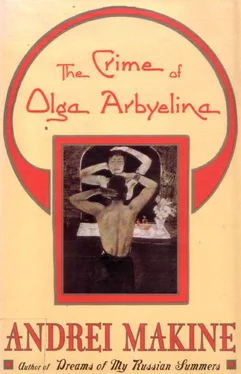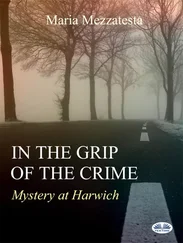Her eyes took in at a glance the lines of relationship which resembled vessels that transmitted the diseased blood:

She looked up above the lamp and felt as if she were meeting a young, calm gaze with no illusions. "So he knew everything. He knows everything," she repeated. The eyes seemed to signify acquiescence with a slight flutter of the eyelids.
If she had not guessed the secret of these markings with the orange crayon, she would certainly have passed a remark the following evening when she once again surprised this delicate and very young man, who moved like a dancer, wheeling about near the kitchen range.
The stranger's actions repeated the scene she had observed before as precisely as a hallucination: a rapid quivering of his hand above the copper vessel; an about-turn toward the table, toward the notebook, his alibi; a moment of stillness, the exaggerated nonchalance with which his fingers turned the pages…
Yes, when she noticed these fluttering movements through the half open bathroom door she would have interrupted him with a cry of reproach, a remonstration… Or rather with some trivial comment to spare him the shame.
But now she remained silent. And yet the similarity with that September evening, the evening when she was gardening, was total. Save for one nuance, perhaps: this time it took her only a second to recognize the young stranger as her son. No more than a second, the time it took to suppress the cry that rose to her lips, to transform it into anodyne words and then, finally, into silence. But this time, above all, there was no longer any doubt.
Later on she would realize that the cry had stuck in her throat because of one memory in particular…
It was two years ago. The last spring under the Occupation. Through the open kitchen window she sees her son running toward the house. All that she sees is his hand pressed to his chest. He has been swimming and has collided with one of the timbers of the old landing stage… He bolts into his room. She goes in, makes him show her what he was trying to hide. "It's nothing serious, honestly." His childish voice is desperately calm. But he lifts his hand. On his chest, above his heart, there is a bruise, turning into a purple swelling, then a whole pouch of blood, almost before her eyes. This hematoma is reminiscent of a woman's breast, smooth, black. She senses that in a confused way the boy is embarrassed by this similarity… During the healing process she recalls the advice given by one of the books that sit on the top shelf in the book room. The parents of a hemophiliac child must, says the author, "win his trust," let him understand that he is "no different from his schoolmates"; they must know how to "disarm fear" with a friendly tone of voice… She tries talking to her son in these borrowed tones that have always been alien to them both. Politely, he remains silent, avoids her eye. With each fresh word she feels she is floundering deeper into a lie it will be difficult to put behind them. In order to break away from the falseness of this dialogue invented for an abstract parent and child, she wills herself to a more confident tone. "So, were you scared? I've written to your father, you know…" He leaps up and rushes out. Ten minutes later a resident of the Caravanserai arrives all out of breath to alert her. They run toward the ruined bridge. Her son, a slim elongated figure, is stepping out, like a tightrope walker, along a steel girder that overhangs the river. A heterogeneous little crowd is following his shaky progress. Olga stops, her gaze hypnotized by the swaying of this body as it makes its way above the void. The cry freezes on her lips. He is a sleepwalker whose tread is supported by the held breaths of everyone else… Reaching the end of the girder he turns round, teeters, waves his arms, clinging at the air that solidifies beneath the petrified gaze of the onlookers, stands up straight again, returns to his starting point, comes down… They return home without exchanging a word. It is only when the door has closed behind them that he says very softly, "I'm not scared of anything." She does not listen to him. She is watching the tiny red trickle snaking between the beauty spots on his forearm, slender and speckled with rust. A quite fresh little scratch that she will compress, recognizing beneath her fingers the unique consistency of his blood.
It was seeing that sleepwalker above the void, in a flash of memory, that made her repress her cry…
That evening she could not help understanding. It was all too evident: the copper vessel; a hand hovering over it with the tingling precision of a criminal act, shaking a little rectangle of paper over the brown liquid; his shadow, already moving away from the range, pivoting and taking refuge in a deliberately neutral pose.
She closed the bathroom door. A second later rapid footsteps went along the corridor. She caught sight of her own face in the slightly misted mirror. What struck her about this oval framed with wet braids was the unrecognizable expression of frightened youthful-ness. But it was the ease of her whole body that was particularly distressing; the fine tone of each of her muscles beneath the fabric of the dressing gown. It was almost with terror that she sensed the supple weight of her breasts, the moist warmth of her skin…
In the kitchen she drank the infusion in a few drafts, pausing only to remove the petals that stuck to her tongue… Then, settled in the book room, she began to wait, like one condemned, for sleep to come flooding over her. The tension only lasted for a few minutes, in fact. A very natural thought, but natural to insanity, made her tremble. "But… before going to sleep, I absolutely must… if not…" She saw her hands clenched on the table in an unaccustomed rigidity, as if they did not belong to her. In the middle of that narrow space her glance hovered against the tight rows of books, against the window layered with opaque darkness. Yes, before she gave way she must at all costs understand how what was happening to her had become possible. The young man with black hair, his features refined by long, secret suffering; the hands that hovered over the kitchen range… Her mind gave way without her being able to put a name to what that action signified for her and for him. Again she saw the plump reptile swollen with blood. She urgently needed to understand how this creature could have invaded her life, their lives. Already she felt the first waves of sleep clouding her vision. She must understand. Otherwise waking up again would be unthinkable. Waking up to what life? How could it be lived? How could she live alongside this mysterious being who had just walked down the corridor with furtive steps? During these last minutes of wakefulness she must find the guilty party. Identify the person, the action, the day that had warped the normal course of things.
She was no longer capable of thinking or remembering. The past assaulted her eyes, her face, with brief clusters of lights and sounds…
A man, handsome, and with a giant's frame, getting into a taxi. The guilty one. Her husband… Before slipping into the vehicle he turned and, guessing with ruthless accuracy the window from which she was secretly watching his departure, gave her a military salute as a clownish gesture of good-bye. And in the days that followed, a child dressed up as a soldier stood at attention in the hall of that Parisian apartment, listening for the familiar footsteps on the stairs…
She did not even have time to grasp how the departure of this man and his mocking salute were connected with the terrifying night she was living through. Already another fragment from an even more distant past was surging up. A man who thought he was dying struggled to master the trembling of his cracked lips and confess his crime to her; he had escaped execution (the hydra of the counterrevolution, he whispered) by thrusting a comrade to his death… Yet this deathbed penitent was the same character as the one who only months after that confession would be directing his ironic military salute at the woman hidden behind the curtains. And the same who in earlier times leaned with all his weight on a roulette table in a room where the smell of cigars mingled with that of the sea at night. The same, only a little younger, who wore an officer's uniform, four St. George's Crosses on his heart, and listened with a solemn and bitter air to the singing at the Russian church in Paris, clutching a candle too slender for his powerful fingers. The same who…
Читать дальше













